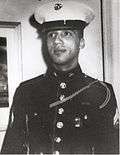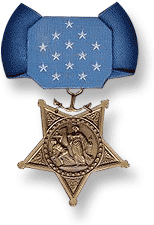Rodney M. Davis
| Rodney Maxwell Davis | |
|---|---|
  Sergeant Rodney M. Davis, USMC, Medal of Honor recipient | |
| Born |
April 7, 1942 Macon, Georgia |
| Died |
September 6, 1967 (aged 25) Quảng Nam Province, South Vietnam |
| Allegiance | United States of America |
| Service/branch | United States Marine Corps |
| Years of service | 1961–1967 |
| Rank | Sergeant |
| Unit | 1st Battalion, 5th Marines |
| Battles/wars | Vietnam War † |
| Awards |
Medal of Honor Purple Heart Vietnam Military Merit Medal Vietnam Gallantry Cross |
Rodney Maxwell Davis (April 7, 1942 – September 6, 1967) was a United States Marine who posthumously received the Medal of Honor for his heroism during the Vietnam War.
Biography
Davis was born on April 7, 1942, in Macon, Georgia to Gordon N. Davis and Ruth A. Davis. He attended elementary school and high school there and graduated from Peter G. Appling High School, May 29, 1961.
Shortly after graduation, he enlisted in the United States Marine Corps in his hometown, August 31, 1961; then reported for recruit training with the First Recruit Training Battalion Marine Corps Recruit Depot Parris Island, South Carolina. Upon completion of recruit training in December 1961, he was transferred to the Marine Corps Base, Camp Lejeune, North Carolina, and underwent Individual Combat Training with the Second Battalion, First Infantry Training Regiment, graduating the following February.
He then joined Company K, 3rd Battalion, 2nd Marines, 2nd Marine Division, FMF, at Camp Lejeune and served as a rifleman until May 1964. While stationed at Camp Lejeune, he was promoted to Private First Class, April 1, 1962, and to Lance Corporal, January 1, 1964.
Lance Corporal Davis was ordered to London, England, for a three-year tour of duty as Guard with the United States Marine Detachment, Naval Activities. He was promoted to Corporal, January 1, 1966, and to Sergeant, December 1, 1966.
Ordered to the Republic of Vietnam in August 1967, he was assigned duty as a Platoon Guide with Company B, First Battalion, Fifth Marines, First Marine Division. On September 6, 1967, he was operating with his unit in the Quảng Nam Province on a search and clear mission during Operation Swift, when they were attacked by a large North Vietnamese force. Elements of the platoon were pinned down in a trench line by mortars, heavy automatic and small arms fire. He went from man to man encouraging them on and also returning fire at the same time. An enemy hand grenade fell in the trenches his men were fighting from and without hesitation he threw himself upon the grenade. He saved his fellow Marines in this selfless act and thus earned the nation's highest military decoration: the Medal of Honor.
Presentation of the Medal was made posthumously to his widow, Mrs. Judy P. Davis, by Vice President Spiro T. Agnew in his office. The Presentation is "in the name of the Congress of the United States."[1]
Sgt. Davis was survived by his wife, Judy P. Davis, two daughters Nichola Davis, and Samantha J. Davis-Steen, Esq.
Awards and honors
His medals and decorations include:
- The frigate USS Rodney M. Davis (FFG-60) was named in his honor.
Medal of Honor citation
The President of the United States in the name of The Congress takes pride in presenting the MEDAL OF HONOR posthumously to
SERGEANT RODNEY M. DAVIS
UNITED STATES MARINE CORPS
for service as set forth in the following CITATION:
For conspicuous gallantry and intrepidity at the risk of his life above and beyond the call of duty while serving as the right guide of the Second Platoon, Company B, First Battalion, Fifth Marines, First Marine Division, in action against enemy forces in Quang Nam Province, Republic of Vietnam, on September 6, 1967. Elements of the Second Platoon were pinned down by a numerically superior force of attacking North Vietnamese Army Regulars. Remnants of the platoon were located in a trench line where Sergeant Davis was directing the fire of his men in an attempt to repel the enemy attack. Disregarding the enemy hand grenades and high volume of small arms and mortar fire, Sergeant Davis moved from man to man shouting words of encouragement to each of them firing and throwing grenades at the onrushing enemy. When an enemy grenade landed in the trench in the midst of his men, Sergeant Davis, realizing the gravity of the situation, and in a final valiant act of complete self-sacrifice, instantly threw himself upon the grenade, absorbing with his own body the full and terrific force of the explosion. Through his extraordinary initiative and inspiring valor in the face of almost certain death, Sergeant Davis saved his comrades from injury and possible loss of life, enabled his platoon to hold its vital position, and upheld the highest traditions of the Marine Corps and the United States Naval Service. He gallantly gave his life for his country.
/S/ RICHARD M. NIXON
See also
References
- ↑ Davis, Rodney (June–July 1969). "The Crisis". Retrieved January 2014. Check date values in:
|access-date=(help)
- "Official Marine Corps biography". Retrieved October 5, 2010.
- "Medal of Honor citation". Archived from the original on July 14, 2007. Retrieved October 5, 2010.
- "USS Rodney M. Davis official website". Retrieved October 5, 2010.
![]() This article incorporates public domain material from websites or documents of the United States Marine Corps.
This article incorporates public domain material from websites or documents of the United States Marine Corps.